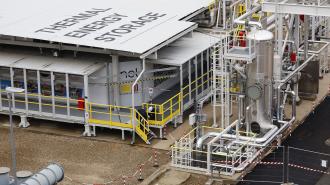Israel’s Brenmiller Energy has announced the opening of a “gigafactory” to manufacture the company’s thermal energy storage systems, which store power as heat and then provide users with energy on demand via steam. The company believes it to be the first factory in the world of its kind.
Thermal energy storage, true to its name, stores energy as heat — a crucial function as society transitions to renewable sources like solar and wind, sources that are now economically viable to gather but, alas, are as variable as the weather and seasons.
Brenmiller is angling for the new facility to be their primary production hub and plans to hit full capacity by the end of 2023.
Brenmiller is angling for the new facility to be their primary production hub and plans to hit full capacity by the end of 2023.
“We’re Israeli—we’re building technologies that can reach up to 1400°F in the middle of the desert—we know a thing or two about harnessing heat, and we’re ready to share that knowledge with the world,” founder and CEO Avi Brenmiller said.
Brenmiller’s thermal energy storage system, called bGEN, can be charged in various ways, the company explained in a video — solar, wind, the grid when there’s excess supply, industrial exhaust gas, and sundry other sources of heat or electricity.
That energy is stored in the bGEN’s storage medium — crushed desert rocks, according to NoCamels — which can store the energy very efficiently as extremely high heat, reaching temperatures of up to 1,382 F (750 C). Water piped through the system is heated by this energy and turned into steam, which can then be accessed on demand.
The gigafactory, which is located in the Negev desert city of Dimona, is expected to generate up to 4 gigawatt hours worth of bGEN units when it reaches full capacity; that’s enough to power potentially 3 million homes, NoCamels reported.
We’d love to hear from you! If you have a comment about this article or if you have a tip for a future Freethink story, please email us at tips@freethink.com.
